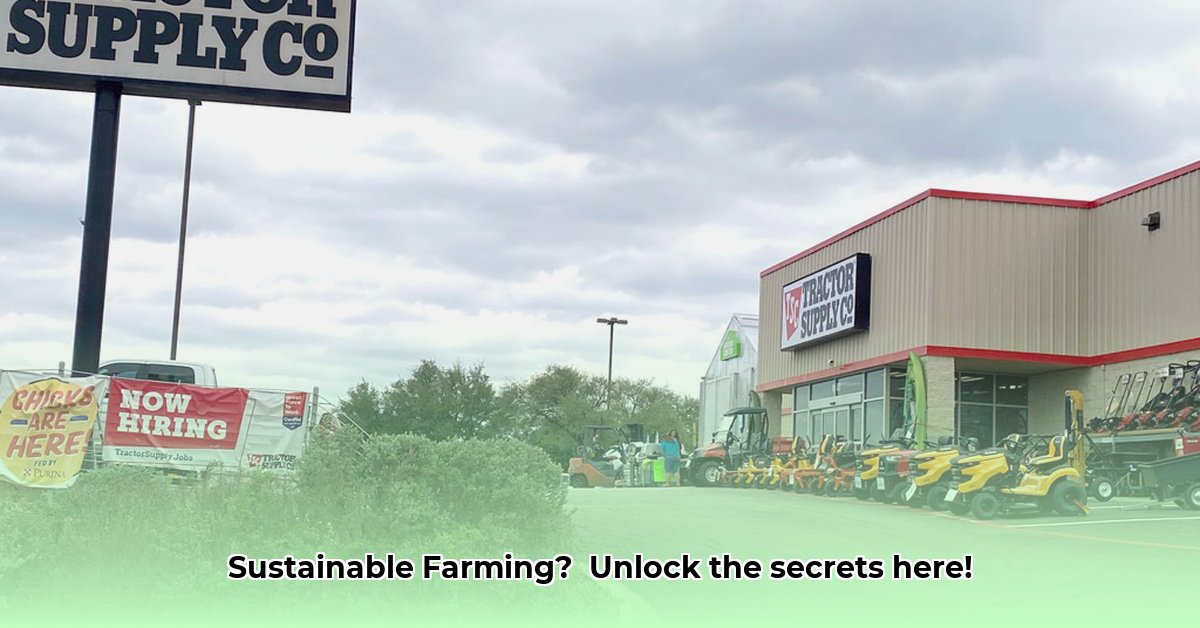
Marble Falls, Texas, boasts a rich agricultural heritage. Tractor Supply Company (TSC), a prominent retailer, significantly impacts this landscape. This investigative report examines TSC's role in promoting sustainable agricultural practices in Marble Falls, analyzing its contributions, shortcomings, and potential for future improvement. Our analysis reveals a mixed picture, highlighting both positive actions and critical areas needing attention. For more information on TSC's sustainability efforts, see this helpful resource.
TSC's Contributions to Sustainable Agriculture
TSC's accessibility and extensive product range benefit Marble Falls farmers. The store stocks items potentially supporting sustainable practices, including organic seeds and water-efficient irrigation systems. This broad selection makes sustainable options more readily available to a diverse range of agricultural producers, from hobbyists to commercial operations. However, the mere availability of such products doesn't automatically equate to a robust commitment to sustainability. More concrete evidence is needed to fully assess TSC’s contribution.
Areas for Improvement: Transparency and Data Gaps
Significant data gaps hinder a thorough evaluation of TSC's impact on sustainable agriculture. A lack of publicly available data on the store's environmental footprint – energy consumption, waste generation, and water usage – significantly limits analysis. Moreover, the absence of clear sustainability certifications on many products prevents consumers from making fully informed choices. This lack of transparency undermines TSC’s efforts to be perceived as a leader in promoting eco-conscious farming. The challenge isn't simply about selling sustainable products; it’s about fostering a genuinely sustainable supply chain and operating model. A crucial question arises: How can we ensure transparency and traceability throughout TSC’s product lines?
Stakeholder Perspectives: A Collaborative Approach
Addressing the identified shortcomings requires a collaborative effort. The following actionable steps outline necessary short-term and long-term actions for relevant stakeholders:
TSC Staff: Short-term: Enhance product knowledge of sustainable options, providing clear labeling and consumer education. Long-term: Undergo comprehensive sustainability training, actively promoting eco-friendly farming practices to consumers and offering guidance on effective implementation.
Local Farmers: Short-term: Actively select sustainable products offered by TSC. Long-term: Participate in sustainable farming workshops, and share best practices within the community.
TSC Corporate: Short-term: Conduct a thorough environmental audit of the Marble Falls location and publicly release the findings. Long-term: Implement and regularly assess store-level sustainability initiatives, tracking progress towards concrete, measurable goals.
Consumers: Short-term: Demand more transparency regarding TSC's sustainability practices; support businesses prioritizing environmental consciousness. Long-term: Advocate for stricter environmental standards, making informed purchasing choices aligned with their values.
Recommendations and Conclusion: A Path Forward
TSC possesses the potential to become a significant driver of sustainable agriculture in Marble Falls. However, realizing this potential requires a concerted commitment to transparency and concrete actions addressing current shortcomings. The company must publicly disclose its environmental footprint, clearly label sustainable products, and actively engage with local farmers and communities to support sustainable practices. Consumers have a crucial role to play; they must actively demand transparency and support businesses demonstrating genuine commitment to eco-friendly practices. Further research into the environmental effects of different agricultural practices and their availability at TSC is needed to ensure informed decision-making. Only through this collaborative approach can we assess and enhance the positive impact of TSC on the region’s agricultural future.